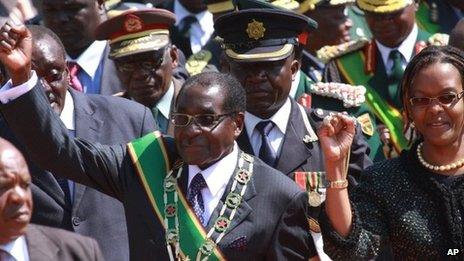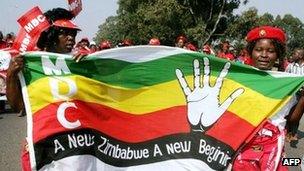Mugabe inauguration: New era or back to old days?
- Published

Robert Mugabe hsa kept silent on the possibility of a new unity government
Hotels in Zimbabwe's capital, Harare, are filling up with foreign dignitaries and the heavy security betrays the nature of the guests booked in.
About 40 heads of state and government will reportedly attend President Robert Mugabe's inauguration, but the hype that normally pre-empts such ceremonies is hardly discernible in the streets.
The mood around the city - a stronghold of the defeated Movement for Democratic Change (MDC) party - will be a striking contrast to the rehearsed colourful celebrations inside a packed National Stadium, where each of the country's 10 provinces is sending in buses loaded with members of Mr Mugabe's Zanu-PF party.
The inauguration organisers have roped in several international performing artists, from the Democratic Republic of Congo, South Africa and Jamaica.
However, the MDC and its leader, outgoing Prime Minister Morgan Tsvangirai, will not be attending, bitter about what they say was a "stolen, and rigged election".
The official word from MDC Secretary General Tendai Biti is that "we weren't invited for the ceremony and we are not attending".
"Even if we were invited, we weren't attending, it would be akin to legitimising an illegitimate process. No-one ever told us such an event was happening, and we don't know about it," he adds.
Olive branch?
Post-election rancour is not dying away. Both party leaders have been trading insults. It is likely to cascade down, polarising supporters and the nation alike.
Zanu-PF insiders are talking of the 89-year-old president working on a lasting legacy.
There seems to be an underlying feeling this could be his last term.
There is also talk of him reaching out to Mr Tsvangirai by offering a seat in a possible unity government - to build on the progress created by the coalition that governed Zimbabwe from 2009 until last month's disputed elections.
But the MDC has indicated it is unwilling to continue its partnership with Zanu-PF.

The MDC has condemned the election as a "farce"
"We will not do that," Mr Biti says.
President Mugabe has kept silent on the possibility of a new unity government, keeping everyone guessing about his strategic plans.
Analysts say he may offer an olive branch to the MDC to avoid political ructions.
"He has to reach out as much as possible," says Shakespeare Hamauswa, a political science lecturer at University of Zimbabwe.
"But he is not, however, obliged. Another unity government can work out if the MDC is willing, but from the look of things, it's not happening," he adds.
Mr Mugabe's legacy, it appears, will now have to anchor on him leaving a peaceful country, while empowering his people and safeguarding Zimbabwe from perceived foreign threats.
"He can still do what he wants, he has a clear two-thirds majority, controls local authorities, and he doesn't care," Mr Hamauswa says.
'Hard sell'
Zanu-PF spokesman Rugare Gumbo says it is premature to discuss the nature and policy direction of the next government, but notes that it "will be different".
"We have graduated from a power-sharing government, we need to come up with new policies, certainly," he says.
Business, industry, and ordinary citizens are watching, gripped by anxiety, and foreign investors are concerned about the potential policy direction.
John, 38, a taxi driver, who plies his trade opposite parliament, has seen his business go up and down.
"We are not expecting much in the next five years," he says.
"Clients I pick from the airport from outside the country are anxious about the business climate, whether it's going to change or not. But they don't seem to trust Mr Mugabe," he says.
"During the World Cup (in 2010), business went up. But over the past years it was getting quiet. Given the concerns of people about the election, we are not going to see much changing in the business patterns," he adds.
John isn't attending the inauguration. "I'm not really into politics or even excited about the event. But if you want me to take you there, we can go. But I don't think there is much in it," he says.
The business community is keeping an eagle eye on the policy direction. Of particular interest, will be the inauguration speech itself.
"Does it carry the nation forward or back, that is the question," says Professor Tony Hawkins, of the University of Zimbabwe Business School.
He believes the business community is particularly concerned about the "policy direction the new cabinet is going to take because a lot of people are still sceptical".
"Even in the United States and the United Kingdom, President Mugabe remains a hard sell. We are wondering how he is going to implement most of his things he said during the campaign because there is no money," he adds.
Lack of ambiguity
Hours after President Mugabe controversial election victory was announced, Zimbabwe's stock exchange plunged, shedding 11% of its value.
The policies of indigenisation, which allows foreign investors to relinquish 51% of their stake to locals, is "of major concern to many investors", Prof Hawkins says.
The bourse reacted because most counters there were foreign-owned. And there are indications it will remain subdued for a long time.
But one significant issue arising from the election is the lack of ambiguity.
"We now have clarity on who is leading the country for the next term," says Farayi Dyirakumunda of African Investment Market.
"The indigenisation policy will take centre stage and this will present an opportunity for some foreign investors looking at Zimbabwean assets to price in appropriate risk premiums in their capital budgeting or investment appraisal models," he says.
"Such investors will participate if their return objectives can be met within the risk parameters they would have set. But another noteworthy aspect is that the economy will maintain a multi-currency regime, possibly during the entire term."
Another key factor is the nature of the cabinet, which Mr Mugabe is expected to appoint a few days after his inauguration.
That will, perhaps, give a hint of the policy direction his government will take for the next half-a-decade.
He has five people from outside parliament whom he can bring into the government as non-constituency legislators.